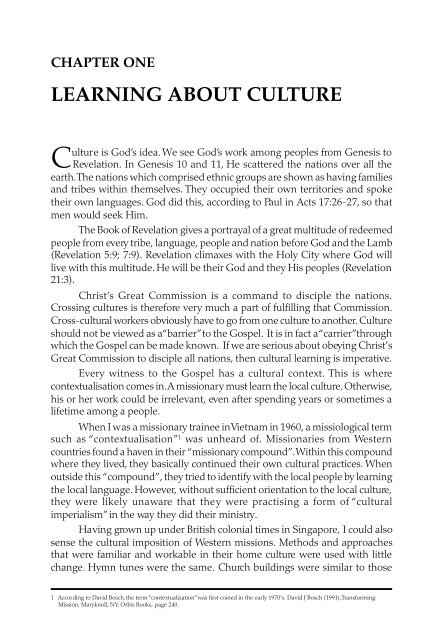WHEN YOU CROSS CULTURES - World Evangelical Alliance
WHEN YOU CROSS CULTURES - World Evangelical Alliance
WHEN YOU CROSS CULTURES - World Evangelical Alliance
You also want an ePaper? Increase the reach of your titles
YUMPU automatically turns print PDFs into web optimized ePapers that Google loves.
CHAPTER ONE<br />
LEARNING ABOUT CULTURE<br />
Culture is God’s idea. We see God’s work among peoples from Genesis to<br />
Revelation. In Genesis 10 and 11, He scattered the nations over all the<br />
earth. The nations which comprised ethnic groups are shown as having families<br />
and tribes within themselves. They occupied their own territories and spoke<br />
their own languages. God did this, according to Paul in Acts 17:26-27, so that<br />
men would seek Him.<br />
The Book of Revelation gives a portrayal of a great multitude of redeemed<br />
people from every tribe, language, people and nation before God and the Lamb<br />
(Revelation 5:9; 7:9). Revelation climaxes with the Holy City where God will<br />
live with this multitude. He will be their God and they His peoples (Revelation<br />
21:3).<br />
Christ’s Great Commission is a command to disciple the nations.<br />
Crossing cultures is therefore very much a part of fulfilling that Commission.<br />
Cross-cultural workers obviously have to go from one culture to another. Culture<br />
should not be viewed as a “barrier” to the Gospel. It is in fact a “carrier” through<br />
which the Gospel can be made known. If we are serious about obeying Christ’s<br />
Great Commission to disciple all nations, then cultural learning is imperative.<br />
Every witness to the Gospel has a cultural context. This is where<br />
contextualisation comes in. A missionary must learn the local culture. Otherwise,<br />
his or her work could be irrelevant, even after spending years or sometimes a<br />
lifetime among a people.<br />
When I was a missionary trainee in Vietnam in 1960, a missiological term<br />
such as “contextualisation” 1 was unheard of. Missionaries from Western<br />
countries found a haven in their “missionary compound”. Within this compound<br />
where they lived, they basically continued their own cultural practices. When<br />
outside this “compound”, they tried to identify with the local people by learning<br />
the local language. However, without sufficient orientation to the local culture,<br />
they were likely unaware that they were practising a form of “cultural<br />
imperialism” in the way they did their ministry.<br />
Having grown up under British colonial times in Singapore, I could also<br />
sense the cultural imposition of Western missions. Methods and approaches<br />
that were familiar and workable in their home culture were used with little<br />
change. Hymn tunes were the same. Church buildings were similar to those<br />
1 According to David Bosch, the term “contextualization” was first coined in the early 1970’s. David J Bosch (1991), Transforming<br />
Mission, Maryknoll, NY: Orbis Books, page 240.<br />
3

















